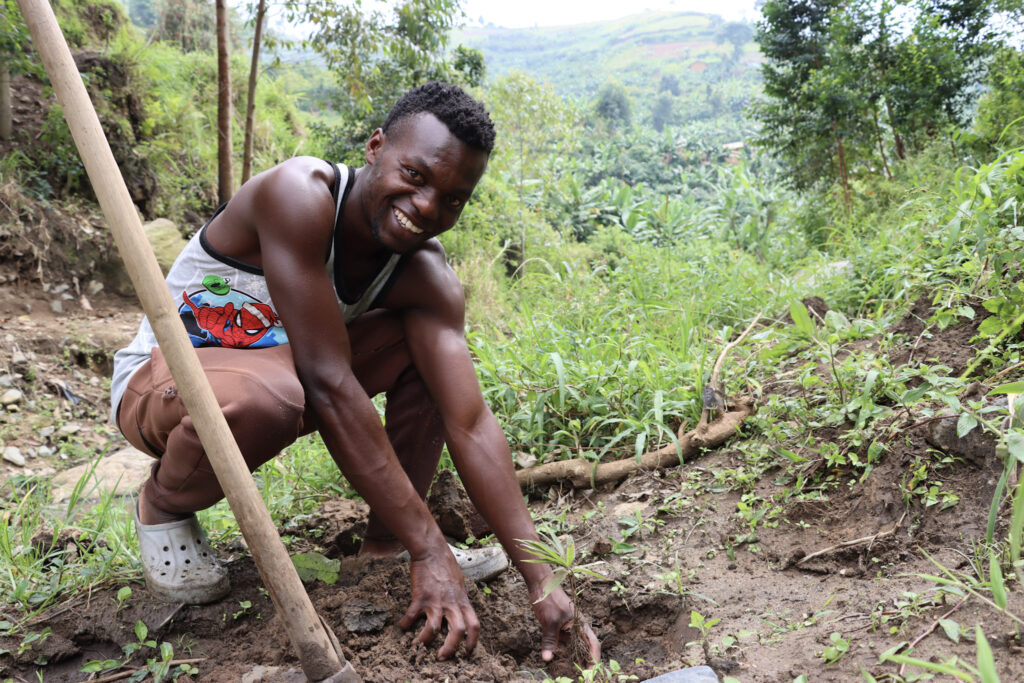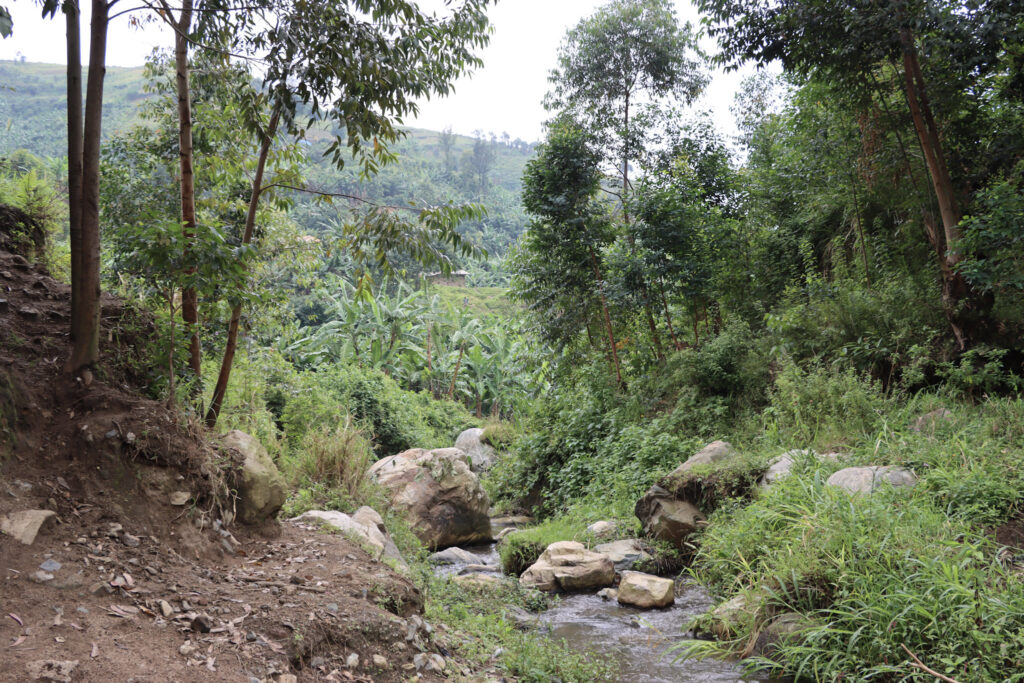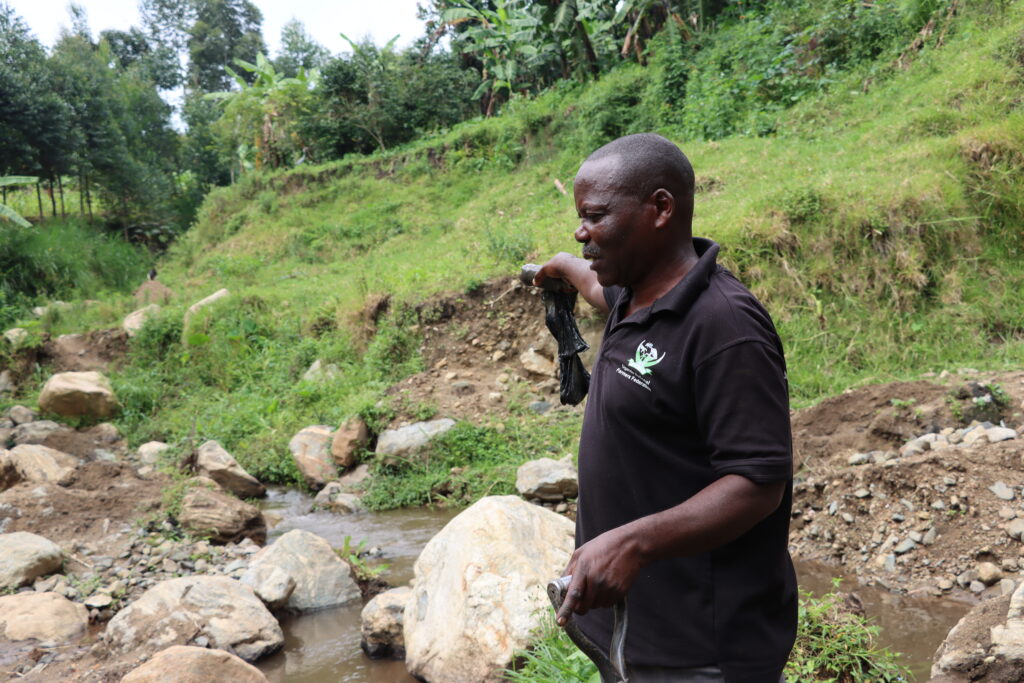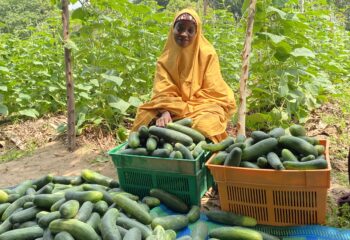
Watershed and land degradation is a growing global concern affecting climate stability, agricultural productivity, and food security. From flooding and soil erosion to nutrient depletion and biodiversity loss, such environmental decline can acutely disrupt ecosystems and livelihoods.
Recognizing the need for climate action and restoration, IFDC, through the Building Resilience and Inclusive Growth of Highland farming systems for rural Transformation (BRIGHT) project, is collaborating with Uganda’s Ministry of Water and Environment (MWE) to empower highland farming communities to revitalize degraded watersheds and convert farmland to sustainable use.
BRIGHT, which operates within Uganda’s Rwenzori, Kigezi, and Mount Elgon regions, raises awareness and fosters community-driven watershed and land restoration initiatives through community dialogues and encouraging the enforcement of environmental conservation laws. The project promotes locally proven soil erosion control measures, such as grass barrier strips, and provides training on watershed and land management practices to ensure sustainability in environmental conservation.
“Safeguarding the environment and watersheds is our shared responsibility. By protecting them, we are protecting our health and agriculture, the very foundation of our livelihoods.”
Muhindo Karyata, Kanyamura Village Local Council 1 Chairperson
The BRIGHT project also distributes tree seedlings and organizes tree planting campaigns along wetlands, streams, and riverbanks to improve water filtration, ensure access to clean and safe water, and reinforce watershed stability to mitigate flooding and soil erosion.
Speaking at a recent watershed conservation activity organized by the project in Kabarole District in the Rwenzori region, BRIGHT Sustainable Land Use and Crop Production Field Officer James Kwesiga emphasized the importance of stewardship and urged communities to play their role.

“Let us all be better guardians of our environment by protecting our water sources. Let us keep them clean, eliminate harmful mining and pollution practices in our rivers, and plant trees along riverbanks. By taking action today, we ensure the sustainable conservation of our watersheds and land for ourselves and future generations,” he stated.
Echoing this sentiment, District Environment Officer Fred Muhanuzi affirmed that community members are fully “equipped…with the knowledge and skills to conserve water sources and the environment.” Acknowledging participants’ active engagement in these efforts, Muhanuzi continued, “Now we are counting on you to lead conservation.”
Muhanuzi also encouraged communities to report illegal construction and agriculture along riverbanks. Similarly, MWE representative Robert Habyona, who oversees wetlands in southwestern Uganda, cautioned participants against involvement in illegal mining activities, for their own sake as well as the environment.
As a result of these initiatives, communities in the regions where BRIGHT operates are now at the forefront of strategic planning and implementation of watershed conservation and appropriate land management. They have established watershed conservation committees dedicated to safeguarding waterways from pollution, mining, and agricultural encroachment, ensuring the long-term sustainability of these vital natural water sources. Additionally, they actively plant trees along watershed banks and work diligently to maintain clean and healthy water and land ecosystems.
Kanyamura Village Local Council 1 Chairperson Muhindo Karyata urged community members to remain committed to protecting watersheds and ensuring proper land management and use, not just for themselves but for their children and future generations.

“Safeguarding the environment and watersheds is our shared responsibility. By protecting them, we are protecting our health and agriculture, the very foundation of our livelihoods. I encourage all of us to care for our watersheds and hold ourselves accountable by reporting those who degrade them. Together, we can keep our rivers, streams, and environment clean and safe,” explained Muhindo.
The impact of watershed conservation and judicious land management extends beyond environmental conservation. By conserving water resources and land, communities benefit from reliable access to clean water for household use and agriculture year-round, reduced risks of flooding and soil degradation, and improved public health with the prevention of waterborne diseases.
Through initiatives such as these, the BRIGHT project is contributing to Ugandan legislation, such as the National Environment (Wetlands, River Banks and Lake Shores Management) Regulations, as well as the United Nations Sustainable Development Goals (SDGs), especially SDG 6 (Access to Clean Water and Sanitation for All) and SDG 13 (Climate Action), by working with partners toward clean water ecosystems across 15 watersheds and fostering prudent land management in Uganda’s Rwenzori, Kigezi, and Mount Elgon regions.
As the BRIGHT project continues to support sustainable watershed and land management practices, it not only strengthens ecosystems but also empowers communities to secure their livelihoods, health, and future.
The Building Resilience and Inclusive Growth for Highland Farming Systems for Rural Transformation (BRIGHT) project, funded by the Netherlands Ministry of Foreign Affairs through the Embassy of the Kingdom of the Netherlands, seeks to build the resilience capacity of farm households and farming systems in Uganda to increase income and food and nutrition security of all farmers and transform households from subsistence to more market-oriented in Kigezi, Mount Elgon, and Rwenzori regions. The project is being implemented by the International Fertilizer Development Center (IFDC) in cooperation with Agriterra, the Uganda Ministry of Agriculture, Animal Industry and Fisheries (MAAIF), the National Agricultural Research Organization (NARO), district local governments, and private sector partners.





